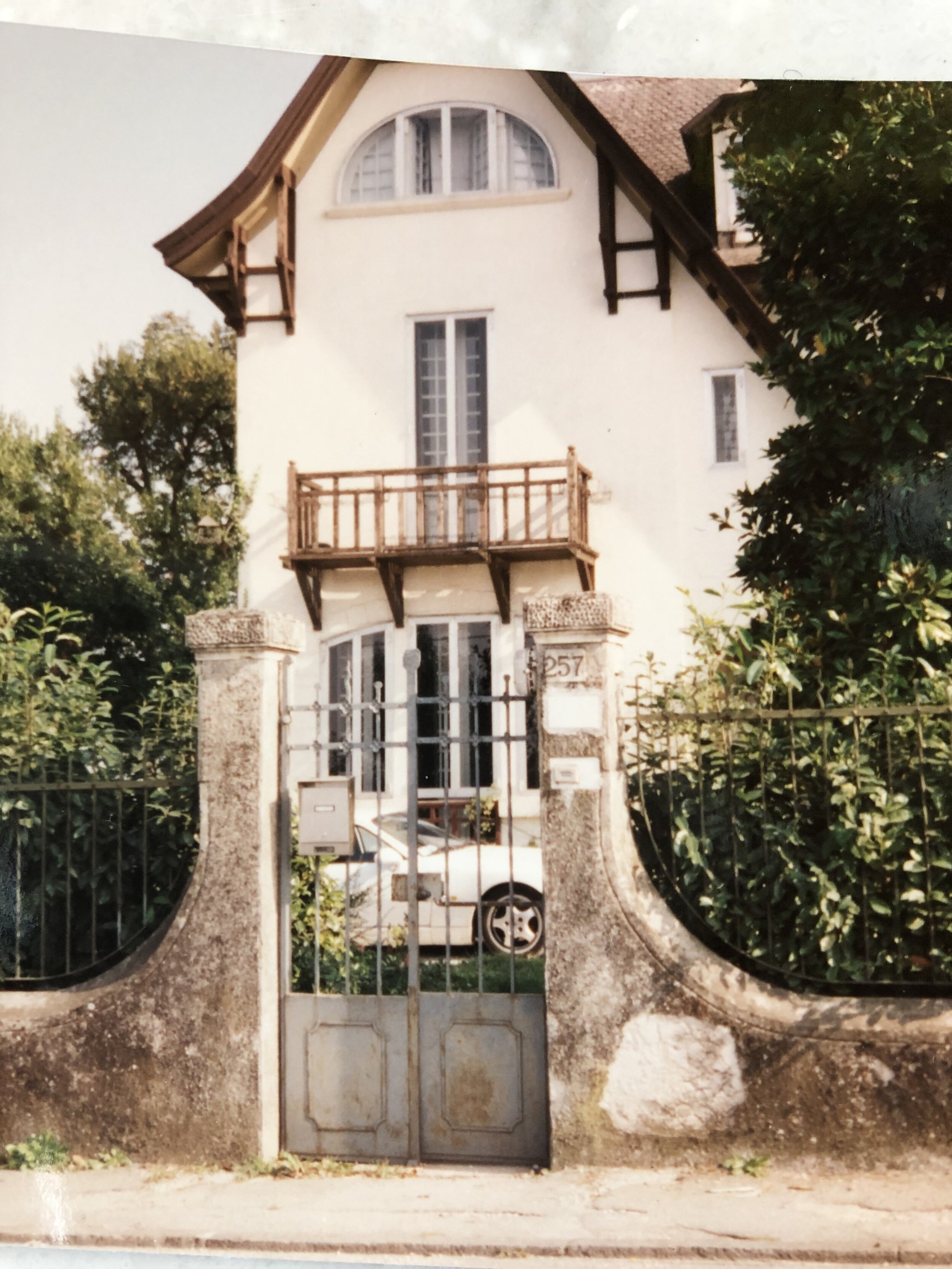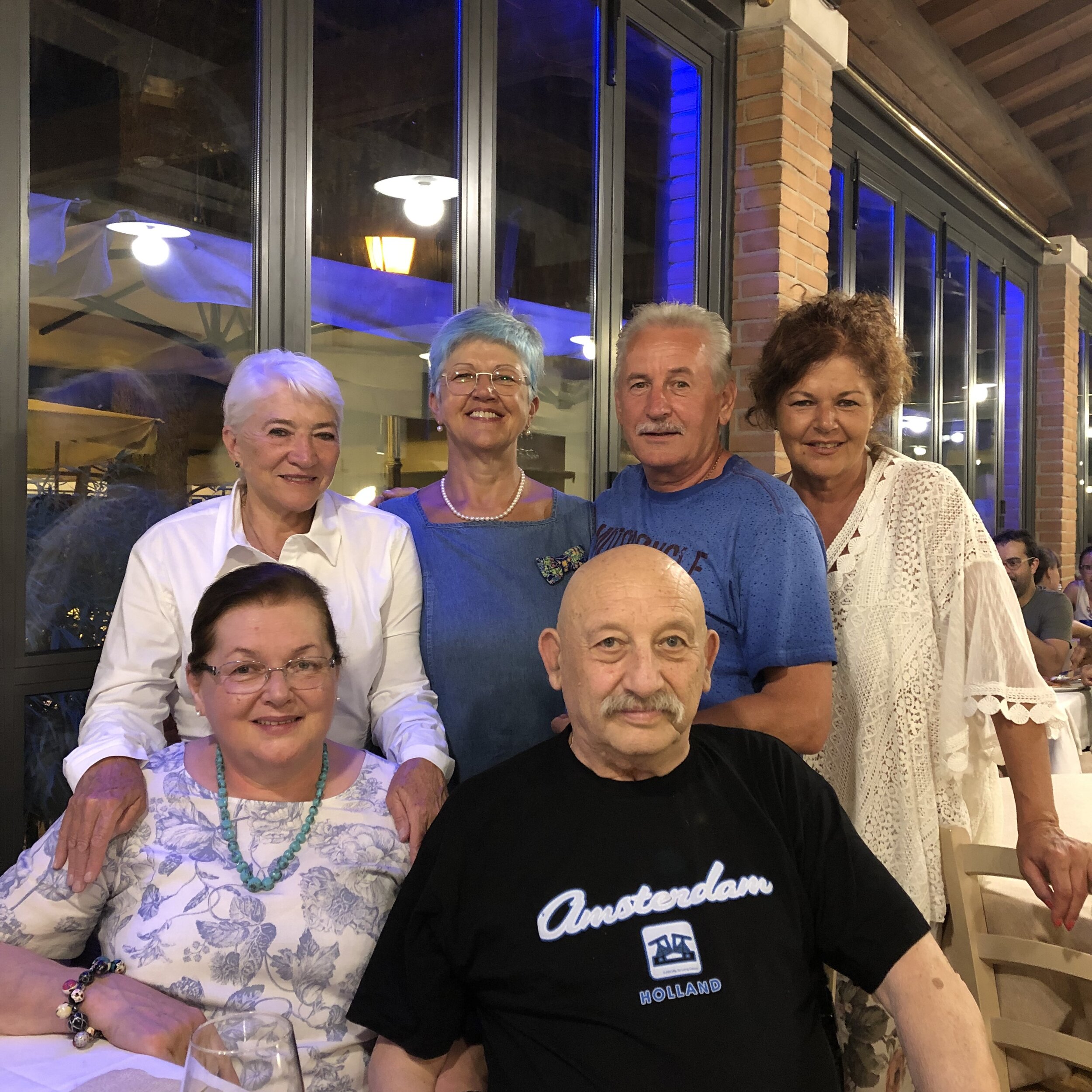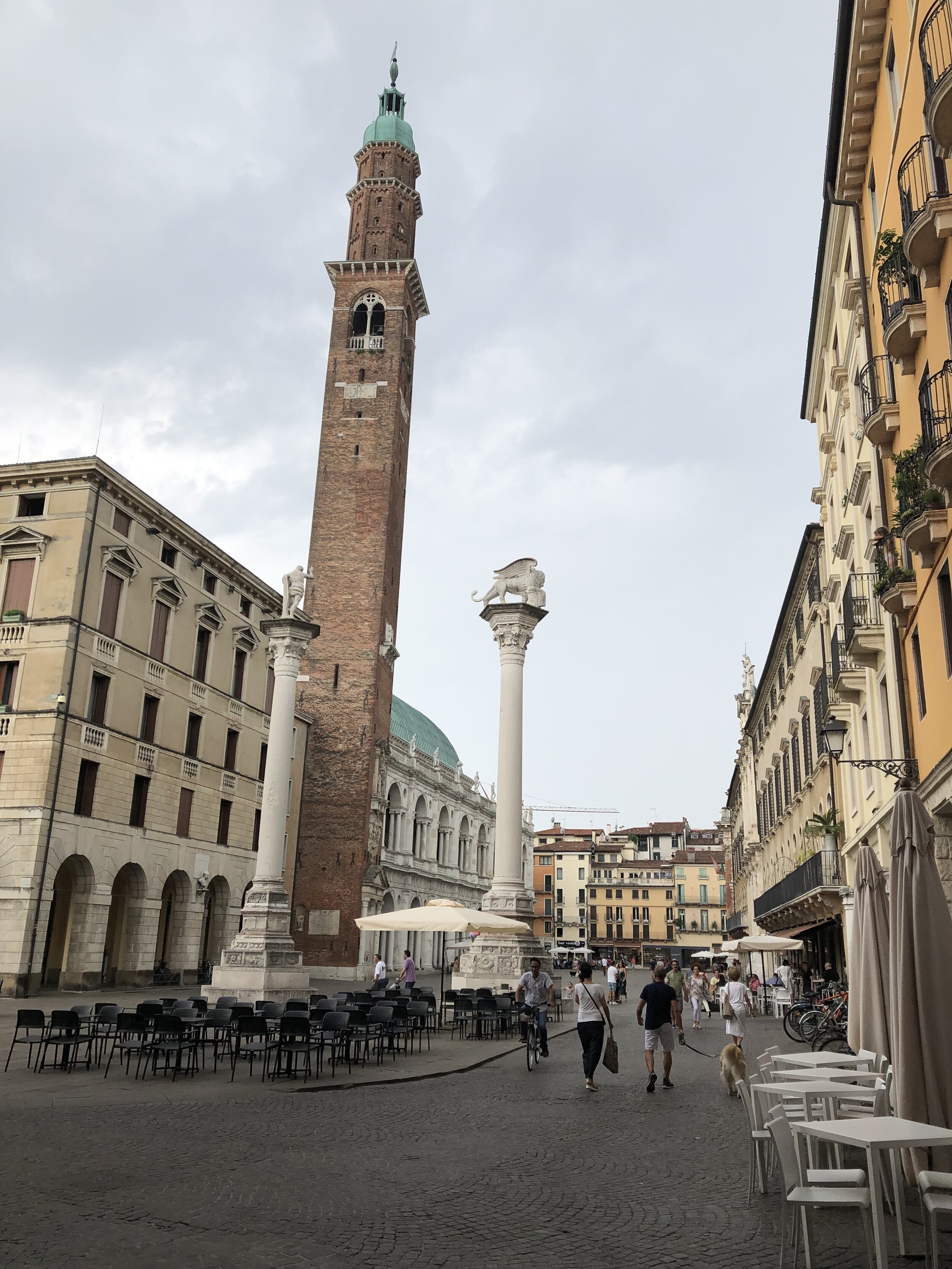Things to Love: The Unexpected, Part II
Heading to Vicenza by train, I’m remembering the snowy winters we had when we lived here from 1962 to 1966. I hope I’ll find a respite from the cauldron-like heat in Venice, but it is just as hot and steamy when I arrive at the Ferrovia Vicenza-Schio near Campo Marzo at midday.
A small street in Vicenza, deserted at midday. Vicenza and its Palladian villas is a World Heritage site. We lived here from 1962 to 1966.
I’m staying at the Relais Santa Corona, located conveniently near Teatro Olympico and Piazza dei Signori in centro cittá, or center of the city. Relais is a French word for travel stop, someplace cozy and homey. This darling little B&B fits the bill and my desire for privacy.
While I’m here, my plan is to visit old family friends and research the history of Villa Chiara, the villa where we lived on Monte Berico. For the book I’m writing, I want to know when it was built and by whom, why the architecture is Tyrolean not Palladian, and why a WWII bomb shelter was built beneath the house. Not only am I not sure where to start my search, I don’t have much time. Pina is expecting me in Bergamo in four days.
A view of Monte Berico and the Basilica di Santa Maria di Monte Berico, constructed in the 1500s.
Maria Bedin, who was our dear nanny and maid, passed away eight years ago. I was fortunate to get back here in time to say goodbye and tell her how much she meant to me. With my father working as the commander of the hospital at the Caserma Ederle (the United States Army Garrison), and my mother busy fulfilling her many duties as an officer’s wife, Maria was more like my real mother. She was there from breakfast to dinner, feeding, dressing, and taking care of us while she had three little girls of her own in a little house in Arcugnano, a village about 20 kilometers up the road. It may have only been three years, but the time we spent with Maria and her family felt like a lifetime. Her girls, Santina the oldest, Lauretta the second and Fabiola, the little one, are all grown up now with husbands and families of their own. Tomorrow we will gather for a great dinner at one of our favorite restaurants on Monte Berico, near the Basilica, with an incredible view of the valley and the Dolomites.
The family of Maria Bedin, Santina, Lauretta and Fabiola. We have been friends for nearly 60 years.
In the meantime, off I go to do my research. After a delicious and all too abundant breakfast, I venture onto Corso Palladio, the main street through Vicenza, no longer open to car traffic. I find City Hall and locate the Property Office but my journey is over as quickly as it began. They tell me there is no house at the address I gave them, and they inform me that if I want any more informatione, I need to know the current owner’s name. Sad and dejected, I decide to cheer myself up with sight-seeing and a day all to myself. The highlight of the day is the Palladio Museum at the Palazzo Barbarano. This is one of the most original museum experiences I have ever had. It is a must if you go to Vicenza.
My next stop is the Gioielleria Oreficeria Argenteria Ageno, a jewelry store established, with others, in the historic Palazzo della Ragione when it was built in the 15th century (the building is now called the Basilica Palladiana). The store has been owned by the same family since 1909. One of the descendants, Gino Ageno, was the brother of Anita Galla, the wife of Doctor Galla, who lived in the villa next to ours on Viale X Giugno. He was known to them as Zio Gino, so that is what we called him, too. I did not expect to find him; he was an older gentleman then, but perhaps someone who might remember him and recognize the gold medallion I was wearing. The Galla’s had given each of us, my mother, my sister, and me, gold medallions engraved with Piazza dei Signori from the Ageno’s store as going away gifts.
The storefront looks exactly as I remembered it, but before I go in something in the window catches my eye: a beautiful pair of earrings. How perfect, I think, as I had wanted to buy a special gift for myself to remember my visit to Vicenza.
Little bells chime when I open the door. Two men, one young, probably in his 30s, and one older, about my age, are behind the counter. I ask to see the earrings. They bring them out, we chat for a minute, and then I show them the medallion. As I am about to explain, the older one of the two men looks at me and smiles.
“You are Heidi Turan, aren’t you? Your father, the Colonello, was Turkish.”
You could have blown me over with a feather.
First let me explain something. Some of you know this. Yes, my name is Louise Hayat Turan, but since my mother’s name is also Louise, and since no one could pronounce Hayat, my grandmother nicknamed me Heidi (for the similarity to the name as much as my white blond hair and penchant for picking flowers). My family has called me Heidi ever since, and so did my Italian family. Only they pronounce it Eyedee.
The Unexpected, again. This lovely gentleman is the son of Gino Argeno. He tells me he remembers biking up Monte Berico to visit his Zia Anita (aunt) and remembers meeting all of us, me, Suzanna (as my little sister was called then), my mother and my father, the Colonello. I am so choked up I can barely speak. The young man with him is his son and is taking over the business. Still choked up, I tell them about my morning and ask if they have any suggestions. Of course, he says, you have to go to Office of Deeds and Property, Ufficio Del Catasto on Via Zampieri. My first clue!
After a tearful goodbye, wearing my beautiful new earrings, and a promise to return soon (who knows now with the virus), I hop in a cab, go the Ufficio, and after some paperwork, discover once again, the address is wrong (no villa with that number) and that I indeed need the current owner’s name. I leave, disappointed once again. Outside the heat blasts me in the face, like further punishment.
That night at dinner with Maria’s family, I recount my day, going to City Hall, Ageno’s, the Ufficio and my sad plight. Lauretta waves her hand dismissively.
“Non ti preoccupi - no worries, Eyedee. Tomorrow we will fix.”
Lauretta and her partner, Lino, pick me up the next day and we drive to Monte Berico to go look at our villa. It has changed. The trim color is brown (no longer green), most of it missing. The garden is in shambles. Gone are the pebble paths, the magnificent magnolias, the fruit trees and little stone fountains. Everything looks how I feel: uncomfortable and sad. That is when I see the house number has changed. It is no longer 95, but 125, which explains why there was no record. I want to leave but Lauretta brazenly rings the doorbell.
Villa Chiara, my home in Vicenza from 1962 – 1966.
An older man comes out and brave Lauretta, in a loud voice, explains who we are and that we want to see the house. Can we come inside? I look at her like she’s crazy but she ignores me. My mission is now hers. Her partner shrugs as if to say, “what did you expect?”
The man standing in the arched doorway pauses and walks hesitantly towards us. He can see that we are not sales people. We chat for a minute more and he opens the gate. Not in my wildest dreams did I think this would ever happen. I am in the garden, and then, unbelievably, I am back in the house.
The garage has been converted into a kitchen which is where he takes us. We meet his wife and they offer us café but we take water instead. I can’t see very much that looks familiar; the old kitchen, the back garden, the heavy green shutters, and the marble floors are more like faint traces, shadows. I am overwhelmed and grateful that Lauretta, our fearless leader, is doing all the talking and questioning. We don’t stay long but miraculously leave with what I need: the correct house number and the owner’s name.
Later that day, after a cool and refreshing nap in my room, I go to Piazza dei Signori to have a cocktail and celebrate. The famous pastry store where we used to stop after picking my sister up from ballet school, Da Menengina, is now a fashionable bar. The beautiful woodwork and paneling are still there, but the glass cases display cicheti, small bites, eggplant, cheese, anchovies, and ham on focaccia instead of cream-filled puff pastries and glossy fruit tartlets. I’m glad I’m wearing my Hermès scarf and carry a Maison Margiela bag. Both earn me nods of approval, recognition by ladies of style that I am one, too. Vicenza has always been that way; all the women beautifully dressed, in high fashion, as if to complement the incredible architecture and history.
Piazza dei Signori in Vicenza, the Basilica Palladiana on the left. This is the heart of the city.
As dusk falls, the cool air rises up from the stone pavement. I’m alone, but hardly. The presence of people loved and lost is as real as if they were sitting next to me: my parents; Maria and her children; the Gallas; Signore, the butcher; Signore Emo, the famous tailor; Mr. Benanti, my favorite teacher at the American school; all the Italians who changed our lives forever – all this time has passed, but they have not gone very far.






